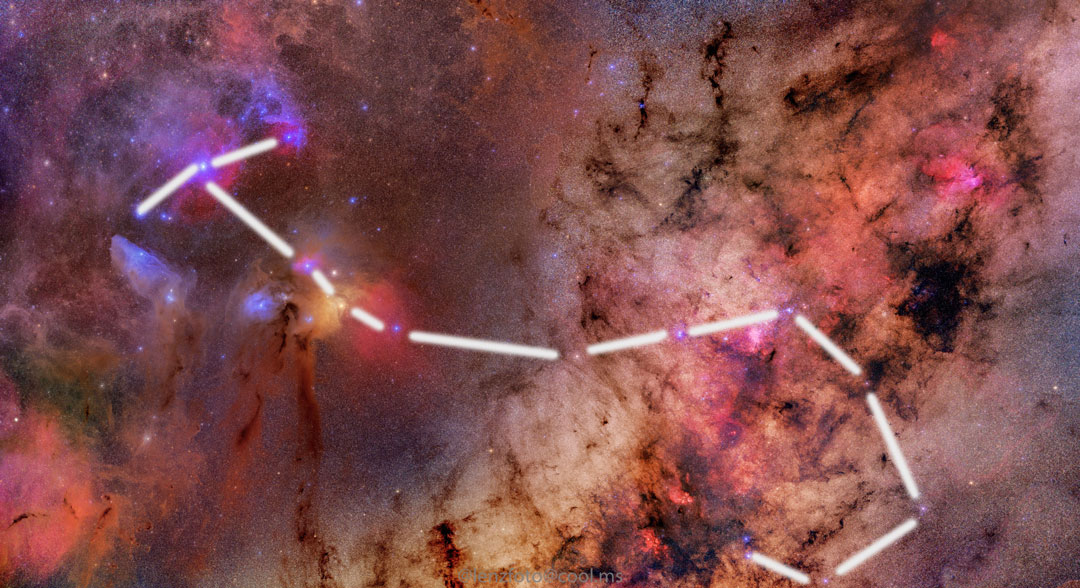Oh wow, I can hardly believe that cosmic color candy!!!

Let's take a look at some of the individual objects in the image:
1) Part of the large emission nebula surrounding runaway star
Zeta Ophiuchi. Compare with Dieter Willasch's photo
Zeta Ophiuchi and neighbours. Google Willasch's photo if it disappears!
2) The Blue Horse!
3) Beta Scorpii (Beta Sco).
4) Delta Sco.
5) Pi Sco.
6) Blue reflection nebula surrounding star Rho Ophiuchi.
7) Red emission nebula and blue reflection nebula surrounding star
Sigma Scorpii.
8)
Globular cluster M4.
9) Yellow reflection nebula surrounding red supergiant star Antares.
10) Red emission nebula surrounding star Tau Sco.
11) Epsilon Sco.
12) Delightful "double star"
Mu1 and Mu2 Sco. The picture is by Roberto Mura from Italian Wikipedia.
13) Red emission nebula IC 4628, also known as the Prawn Nebula.
14) Bright open cluster NGC 6231. Together the Prawn Nebula and NGC 6231 form the
False Comet. If the picture disappears, google "Caelum Observatory. Best of AOP: IC 4628, NGC 6321, and regions North of Zeta Scorpii by Adam Block/NOAO/AURA/NSF". Zeta Scorpii is the "double star" at bottom right in the Caelum Observatory image. Note: You may also google a picture of the False Comet by Jose Carlos Diniz.
15) Eta Sco.
16) Theta Sco.
17) Iota Sco.
18) Lambda Sco, Shaula, the second brightest-looking star in Scorpius after Antares.
19) Kappa Sco. It forms a nice blue "pair" (all right, a very wide pair) with Lambda Sco. I was going to show you a picture, but Google only offers me a picture where Lambda and Kappa look orange!
20)
NGC 6357, the Lobster Nebula.
21) NGC 6334, the
Cat's Paw Nebula.
22)
Cluster NGC 6193, ionizing emission nebula NGC 6188. I love the superb picture by Astrodrudis, Joseph M. Drudis, of the brilliant O3 star HD 150136, one of the hottest stars in the galaxy, and the "ridge" of dust its ferocious stellar wind and onslaught of ultraviolet light is pushing away from it. Okay, I can't resist, I'm going to post it as an attachment! And I'll add a picture of the False Comet, too, since the one I tried to hotlink has disappeared.
NGC 6193 (cluster) and NGC 6188 (nebula). Photo: Jospeh M. Drudis.
The False Comet by Jose Carlos Diniz. The red nebulosity at top
is IC 4628, and the large white "blob" below center is cluster NGC 6231.
Note the "line" of stars that seemingly run from IC 4628 to NGC 6231.
The two bright stars near bottom are Zeta1 and Zeta2 Sco.
Yellow Zeta2 is nearby, but white Zeta1 is a distant supergiant.
Ann
 Scorpius Enhanced
Scorpius Enhanced


